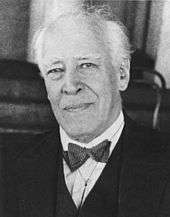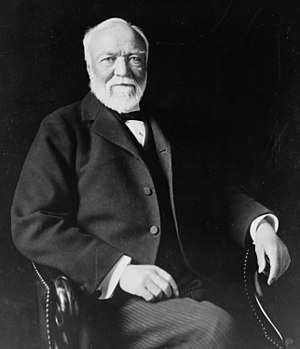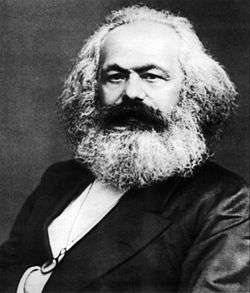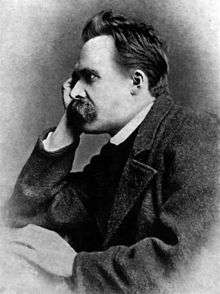19th century
The 19th (nineteenth) century was a century that began on January 1, 1801, and ended on December 31, 1900.
| Millennium: | 2nd millennium |
|---|---|
| Centuries: | |
| Timelines: | |
| State leaders: |
|
| Decades: | |
| Categories: | Births – Deaths Establishments – Disestablishments |
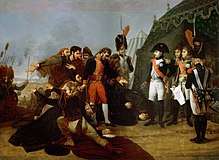
The 19th century saw large amounts of social change; slavery was abolished, and the First and Second Industrial Revolutions (which also overlap with the 18th and 20th centuries, respectively) led to massive urbanization and much higher levels of productivity, profit and prosperity. The Islamic gunpowder empires were formally dissolved and European imperialism brought much of South Asia, Southeast Asia and almost all of Africa under colonial rule.
It was marked by the collapse of the Spanish, Zulu Kingdom, First French, Holy Roman and Mughal empires. This paved the way for the growing influence of the British Empire, the Russian Empire, the United States, the German Empire (essentially replacing the Holy Roman Empire), the Second French Empire, the Kingdom of Italy and Meiji Japan, with the British boasting unchallenged dominance after 1815. After the defeat of the French Empire, and its Indian allies in the Napoleonic Wars, the British and Russian empires expanded greatly, becoming the world's leading powers. The Russian Empire expanded in the Caucasus, central and far eastern Asia.
The remaining powers in the Indian subcontinent such as the Kingdom of Mysore and its French allies, Nawabs of Bengal, Maratha Empire, Sikh Empire and the princely states of the Nizam of Hyderabad, suffered a massive decline, and their dissatisfaction with British East India Company's rule led to the Indian Rebellion of 1857, marking its dissolution, however, it was later ruled directly by the British Crown through the establishment of the British Raj.
The British Empire grew rapidly in the first half of the century, especially with the expansion of vast territories in Canada, Australia, South Africa and heavily populated India, and in the last two decades of the century in Africa. By the end of the century, the British Empire controlled a fifth of the world's land and one-quarter of the world's population. During the post-Napoleonic era, it enforced what became known as the Pax Britannica, which had ushered in unprecedented globalization and economic integration on a massive scale.
Overview
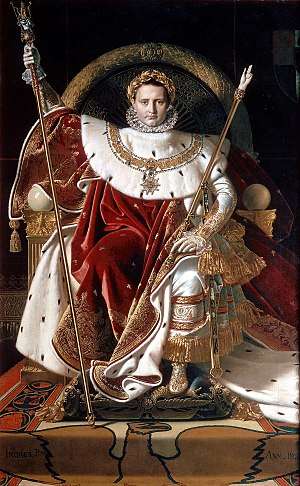
The first electronics appeared in the 19th century, with the introduction of the electric relay in 1835, the telegraph and its Morse code protocol in 1837, the first telephone call in 1876,[1] and the first functional light bulb in 1878.[2]
The 19th century was an era of rapidly accelerating scientific discovery and invention, with significant developments in the fields of mathematics, physics, chemistry, biology, electricity, and metallurgy that laid the groundwork for the technological advances of the 20th century.[3] The Industrial Revolution began in Great Britain and spread to continental Europe, North America and Japan.[4] The Victorian era was notorious for the employment of young children in factories and mines, as well as strict social norms regarding modesty and gender roles.[5] Japan embarked on a program of rapid modernization following the Meiji Restoration, before defeating China, under the Qing Dynasty, in the First Sino-Japanese War. Advances in medicine and the understanding of human anatomy and disease prevention took place in the 19th century, and were partly responsible for rapidly accelerating population growth in the western world. Europe's population doubled during the 19th century, from approximately 200 million to more than 400 million.[6] The introduction of railroads provided the first major advancement in land transportation for centuries, changing the way people lived and obtained goods, and fuelling major urbanization movements in countries across the globe. Numerous cities worldwide surpassed populations of a million or more during this century. London became the world's largest city and capital of the British Empire. Its population increased from 1 million in 1800 to 6.7 million a century later. The last remaining undiscovered landmasses of Earth, including vast expanses of interior Africa and Asia, were explored during this century, and with the exception of the extreme zones of the Arctic and Antarctic, accurate and detailed maps of the globe were available by the 1890s. Liberalism became the pre-eminent reform movement in Europe.[7]

Slavery was greatly reduced around the world. Following a successful slave revolt in Haiti, Britain and France stepped up the battle against the Barbary pirates and succeeded in stopping their enslavement of Europeans. The UK's Slavery Abolition Act charged the British Royal Navy with ending the global slave trade.[8] The first colonial empire in the century to abolish slavery was the British, who did so in 1834. America's 13th Amendment following their Civil War abolished slavery there in 1865, and in Brazil slavery was abolished in 1888 (see Abolitionism). Similarly, serfdom was abolished in Russia in 1861.
The 19th century was remarkable in the widespread formation of new settlement foundations which were particularly prevalent across North America and Australia, with a significant proportion of the two continents' largest cities being founded at some point in the century. Chicago in the United States and Melbourne in Australia were non-existent in the earliest decades but grew to become the 2nd largest cities in the United States and British Empire respectively by the end of the century. In the 19th century, approximately 70 million people left Europe, with most migrating to the United States.[9]
The 19th century also saw the rapid creation, development, and codification of many sports, particularly in Britain and the United States. Association football, rugby union, baseball and many other sports were developed during the 19th century, while the British Empire facilitated the rapid spread of sports such as cricket to many different parts of the world. Also, women's fashion was a very sensitive topic during this time, as women showing their ankles was viewed to be scandalous.
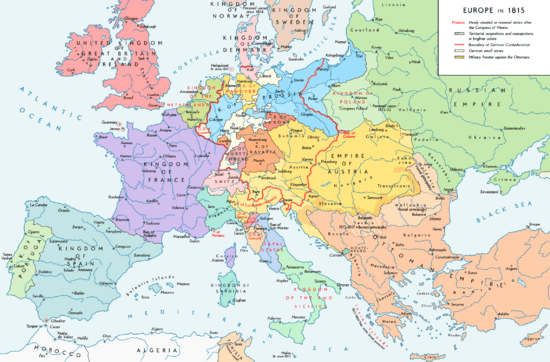
It also marks the fall of the Ottoman rule of the Balkans which led to the creation of Serbia, Bulgaria, Montenegro and Romania as a result of the second Russo-Turkish War, which in itself followed the great Crimean War.
Eras

- Industrial revolution
- European imperialism
- British Regency, Victorian era (UK, British Empire)
- Bourbon Restoration, July Monarchy, French Second Republic, Second French Empire, French Third Republic (France)
- Belle Époque (Europe)
- Edo period, Meiji period (Japan)
- Qing dynasty (China)
- Joseon dynasty (Korea)
- Zulu Kingdom (South Africa)
- Tanzimat, First Constitutional Era (Ottoman Empire)
- Russian Empire
- American Manifest Destiny, The Gilded Age
Wars
Napoleonic Wars

The Napoleonic Wars were a series of major conflicts from 1803 to 1815 pitting the French Empire and its allies, led by Napoleon I, against a fluctuating array of European powers formed into various coalitions, financed and usually led by the United Kingdom. The wars stemmed from the unresolved disputes associated with the French Revolution and its resultant conflict.
In the aftermath of the French Revolution, Napoleon Bonaparte gained power in France in 1799. In 1804, he crowned himself Emperor of the French.
In 1805, the French victory over an Austrian-Russian army at the Battle of Austerlitz ended the War of the Third Coalition. As a result of the Treaty of Pressburg, the Holy Roman Empire was dissolved.
Later efforts were less successful. In the Peninsular War, France unsuccessfully attempted to establish Joseph Bonaparte as King of Spain. In 1812, the French invasion of Russia had massive French casualties, and was a turning point in the Napoleonic Wars.
In 1814, after defeat in the War of the Sixth Coalition, Napoleon abdicated and was exiled to Elba. Later that year, he escaped exile and began the Hundred Days before finally being defeated at the Battle of Waterloo and exiled to Saint Helena, an island in the South Atlantic Ocean.
After Napoleon's defeat, the Congress of Vienna was held to determine new national borders. The Concert of Europe attempted to preserve this settlement was established to preserve these borders, with limited impact.
Latin American independence
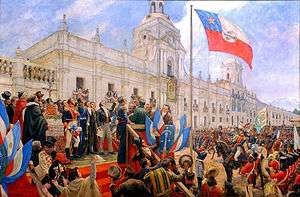
Most countries in Central America and South America obtained independence from colonial overlords during the 19th century. In 1804, Haiti gained independence from France. In Mexico, the Mexican War of Independence was a decade-long conflict that ended in Mexican independence in 1821.
Due to the Napoleonic Wars, the royal family of Portugal relocated to Brazil from 1808–1821, leading to Brazil having a separate monarchy from Portugal.
The Federal Republic of Central America gained independence from Spain in 1821 and from Mexico in 1823. After several rebellions, by 1841 the federation had dissolved into the independent countries of Guatemala, El Salvador, Honduras, Nicaragua, and Costa Rica.[10]
In 1830, the post-colonial nation of Gran Colombia dissolved and the nations of Colombia (including modern-day Panama), Ecuador, and Venezuela took its place.
Revolutions of 1848
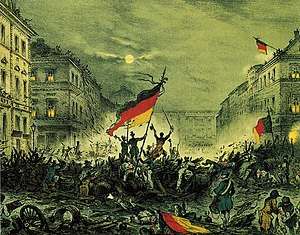
The Revolutions of 1848 were a series of political upheavals throughout Europe in 1848. The revolutions were essentially democratic and liberal in nature, with the aim of removing the old monarchical structures and creating independent nation states.
The first revolution began in January in Sicily. Revolutions then spread across Europe after a separate revolution began in France in February. Over 50 countries were affected, but with no coordination or cooperation among their respective revolutionaries.
According to Evans and von Strandmann (2000), some of the major contributing factors were widespread dissatisfaction with political leadership, demands for more participation in government and democracy, demands for freedom of the press, other demands made by the working class, the upsurge of nationalism, and the regrouping of established government forces.[11]
Abolition and the American Civil War
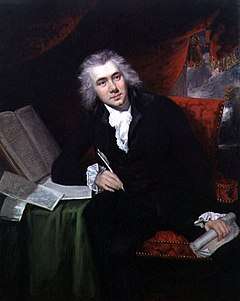
The abolitionism movement achieved success in the 19th century. The Atlantic slave trade was abolished in 1808, and by the end of the century, almost every government had banned slavery. The Slavery Abolition Act of 1833 banned slavery throughout the British Empire, and the Lei Áurea abolished slavery in Brazil in 1888.
Abolitionism in the United States continued until the end of the American Civil War. Among others Frederick Douglass, and Harriet Tubman, were two of many American Abolitionists who helped win the fight against slavery. Douglass was an articulate orator and incisive antislavery writer; while Tubman's efforts was by using a network of antislavery activists and safe houses known as the Underground Railroad.
The American Civil War took place from 1861–1865. Eleven southern states seceded from the United States, largely over concerns related to slavery. In 1863, President Abraham Lincoln issued the Emancipation Proclamation. Lincoln issued a preliminary[12] on September 22, 1862 warning that in all states still in rebellion (Confederacy) on January 1, 1863, he would declare their slaves "then, thenceforward, and forever free."[13] The Thirteenth Amendment to the Constitution,[14] ratified in 1865, officially abolished slavery in the entire country.
Five days after Robert E. Lee surrendered at Appomattox Courthouse, Virginia, Lincoln was assassinated by actor and Confederate sympathiser John Wilkes Booth.
Decline of the Ottoman Empire
In 1830, Greece became the first country to break away from the Ottoman Empire after the Greek War of Independence. In 1831, the Great Bosnian uprising against Ottoman rule occurred. In 1817, the Principality of Serbia became suzerain from the Ottoman Empire, and in 1867, it passed a Constitution which defined its independence from the Ottoman Empire. In 1876, Bulgarians instigate the April Uprising against Ottoman rule. Following the Russo-Turkish War, the Treaty of Berlin recognized the formal independence of the Principality of Serbia, Montenegro and Romania. Bulgaria becomes autonomous.
China: Taiping Rebellion
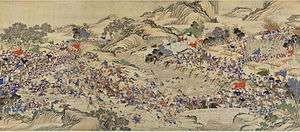
The Taiping Rebellion was the bloodiest conflict of the 19th century, leading to the deaths of 20 million people. Its leader, Hong Xiuquan, declared himself the younger brother of Jesus Christ and developed a new Chinese religion known as the God Worshipping Society. After proclaiming the establishment of the Taiping Heavenly Kingdom in 1851, the Taiping army conquered a large part of China, capturing Nanjing in 1853. In 1864, after the death of Hong Xiuquan, Qing forces recaptured Nanjing and ended the rebellion.[15]
Japan: Meiji Restoration
During the Edo period, Japan largely pursued an isolationist foreign policy. In 1853, United States Navy Commodore Matthew C. Perry threatened the Japanese capital Edo with gunships, demanding that they agree to open trade. This led to the opening of trade relations between Japan and foreign countries, with the policy of Sakoku formally ended in 1854.
By 1872, the Japanese government under Emperor Meiji had eliminated the daimyō system and established a strong central government. Further reforms included the abolishment of the samurai class, rapid industrialization and modernization of government, closely following European models.[16]
Colonialism
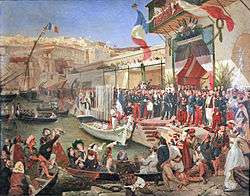
In 1862, France gained its first foothold in Southeast Asia, and in 1863 France annexes Cambodia.
- 1803: The United States more than doubles in size when it buys out France's territorial claims in North America via the Louisiana Purchase. This begins the U.S.'s westward expansion to the Pacific referred to as its Manifest Destiny which involves annexing and conquering land from Mexico, Britain, and Native Americans.
- 1823–1887: The British Empire annexed Burma (now also called Myanmar) after three Anglo-Burmese Wars.
- 1867: The United States purchases Alaska from Russia.
Africa

In Africa, European exploration and technology led to the colonization of almost the entire continent by 1898. New medicines such as quinine and more advanced firearms allowed European nations to conquer native populations.[17]
Motivations for the Scramble for Africa included national pride, desire for raw materials, and Christian missionary activity. Britain seized control of Egypt to ensure control of the Suez Canal. France, Belgium, Portugal, and Germany also had substantial colonies. The Berlin Conference of 1884–1885 attempted to reach agreement on colonial borders in Africa, but disputes continued, both amongst European powers and in resistance by the native population.[17]
In 1867, diamonds were discovered in the Kimberley region of South Africa. In 1886, gold was discovered in Transvaal. This led to colonization in Southern Africa by the British and business interests, led by Cecil Rhodes.[17]
Other wars
- 1801–1815: the First Barbary War and the Second Barbary War between the United States and the Barbary States of North Africa.
- 1804–1810: Fulani Jihad in Nigeria.
- 1804–1813: Russo-Persian War.
- 1806–1812: Russo-Turkish War, Treaty of Bucharest.
- 1808–1809: Russia conquers Finland from Sweden in the Finnish War.
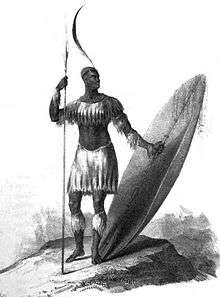 1816: Shaka rises to power over the Zulu Kingdom. Zulu expansion was a major factor of the Mfecane ("Crushing") that depopulated large areas of southern Africa
1816: Shaka rises to power over the Zulu Kingdom. Zulu expansion was a major factor of the Mfecane ("Crushing") that depopulated large areas of southern Africa - 1810: The Grito de Dolores begins the Mexican War of Independence.
- 1810s–1820s: Punjab War between the Sikh Empire and British Empire.
- 1812–1815: War of 1812 between the United States and Britain; ends in a draw, except that Native Americans lose power.
- 1813–1837: Afghan–Sikh Wars.
- 1814–16: Anglo-Nepalese War between Nepal (Gurkha Empire) and British Empire.
- 1817: First Seminole War begins in Florida.
- 1817: Russia commences its conquest of the Caucasus.
- 1820: Revolutions of 1820 in Southern Europe
- 1825–1830: Java War.
- 1826–1828: After the final Russo-Persian War, the Persian Empire took back territory lost to Russia from the previous war.
- 1828–1832: Black War in Tasmania leads to the near extinction of the Tasmanian aborigines
- 1830: November Uprising in Poland against Russia.
- 1830: End of the Diponegoro war. The whole area of Yogyakarta and Surakarta Manca nagara Dutch seized. 27 September, Klaten Agreement determines a fixed boundary between Surakarta and Yogyakarta and permanently divide the kingdom of Mataram was signed by Sasradiningrat, Pepatih Dalem Surakarta, and Danurejo, Pepatih Dalem Yogyakarta. Mataram is a de facto and de yure controlled by the Dutch East Indies.
- 1831: France invades and occupies Algeria.
- 1831–1833: Egyptian–Ottoman War.
- 1846–1848: The Mexican–American War leads to Mexico's cession of much of the modern-day Southwestern United States.
- 1853–1856: Crimean War between France, the United Kingdom, the Ottoman Empire and Russia.
- 1857 Indian Mutiny against British
- 1861–1865: American Civil War between the Union and seceding Confederacy.
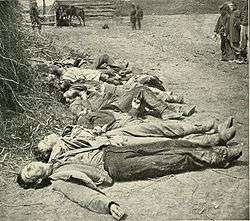 Dead Confederate soldiers. 30% of all Southern white males 18–40 years of age died in the American Civil War.[18]
Dead Confederate soldiers. 30% of all Southern white males 18–40 years of age died in the American Civil War.[18] - 1861–1867: French intervention in Mexico and the creation of the Second Mexican Empire, ruled by Maximilian I of Mexico and his consort Carlota of Mexico.
- 1863–1865: Polish uprising against the Russian Empire.
- 1864–1870: The Paraguayan War ends Paraguayan ambitions for expansion and destroys much of the Paraguayan population.
- 1866: Austro-Prussian War results in the dissolution of the German Confederation and the creation of the North German Confederation and the Austrian-Hungarian Dual Monarchy.
- 1868-1869: Boshin War results in end of the shogunate and the founding the Japanese Empire.
- 1868–1878: Ten Years' War between Cuba and Spain.
- 1870–1871: The Franco-Prussian War results in the unifications of Germany and Italy, the collapse of the Second French Empire and the emergence of a New Imperialism.
- 1879: Anglo-Zulu War results in British victory and the annexation of the Zulu Kingdom.
- 1879–1880: Little War against Spanish rule in Cuba leads to rebel defeat.
- 1879–1883: Chile battles with Peru and Bolivia over Andean territory in the War of the Pacific.
- 1880–1881: the First Boer War.
- 1881–1899: The Mahdist War in Sudan.
- 1882: The Anglo-Egyptian War British invasion and subsequent occupation of Egypt
- 1894–1895: After the First Sino-Japanese War, China cedes Taiwan to Japan and grants Japan a free hand in Korea.
- 1895: Taiwan is ceded to the Empire of Japan as a result of the First Sino-Japanese War.
- 1895–1896: Abyssinia defeats Italy in the First Italo–Ethiopian War.
- 1895–1898: Cuban War for Independence results in Cuban independence from Spain.
- 1896-1898: Philippine Revolution results Filipino victory.
- 1898: The Spanish–American War results in independence of Cuba.
- 1899–1901: The Boxer Rebellion in China is suppressed by an Eight-Nation Alliance.
- 1899–1902: The Thousand Days' War in Colombia breaks out between the "Liberales" and "Conservadores", culminating with the loss of Panama in 1903.
- 1899–1902: Second Boer War begins.
- 1899–1902: Philippine–American War begins.
Science and technology
- ^ Engraving after 'Men of Science Living in 1807-8', John Gilbert engraved by George Zobel and William Walker, ref. NPG 1075a, National Portrait Gallery, London, accessed February 2010
- ^ Smith, HM (May 1941). "Eminent men of science living in 1807-8". J. Chem. Educ. 18 (5): 203. doi:10.1021/ed018p203.
The 19th century saw the birth of science as a profession; the term scientist was coined in 1833 by William Whewell,[19] which soon replaced the older term of (natural) philosopher. Among the most influential ideas of the 19th century were those of Charles Darwin (alongside the independent researches of Alfred Russel Wallace), who in 1859 published the book The Origin of Species, which introduced the idea of evolution by natural selection. Another important landmark in medicine and biology were the successful efforts to prove the germ theory of disease. Following this, Louis Pasteur made the first vaccine against rabies, and also made many discoveries in the field of chemistry, including the asymmetry of crystals. In chemistry, Dmitri Mendeleev, following the atomic theory of John Dalton, created the first periodic table of elements. In physics, the experiments, theories and discoveries of Michael Faraday, André-Marie Ampère, James Clerk Maxwell, and their contemporaries led to the creation of electromagnetism as a new branch of science. Thermodynamics led to an understanding of heat and the notion of energy was defined. Other highlights include the discoveries unveiling the nature of atomic structure and matter, simultaneously with chemistry – and of new kinds of radiation. In astronomy, the planet Neptune was discovered. In mathematics, the notion of complex numbers finally matured and led to a subsequent analytical theory; they also began the use of hypercomplex numbers. Karl Weierstrass and others carried out the arithmetization of analysis for functions of real and complex variables. It also saw rise to new progress in geometry beyond those classical theories of Euclid, after a period of nearly two thousand years. The mathematical science of logic likewise had revolutionary breakthroughs after a similarly long period of stagnation. But the most important step in science at this time were the ideas formulated by the creators of electrical science. Their work changed the face of physics and made possible for new technology to come about including a rapid spread in the use of electric illumination and power in the last two decades of the century and radio wave communication at the end of the 1890s.
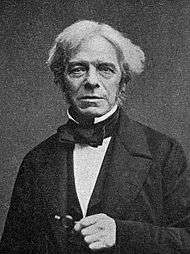
- 1807: Potassium and Sodium are individually isolated by Sir Humphry Davy.
- 1831–1836: Charles Darwin's journey on HMS Beagle.
- 1859: Charles Darwin publishes On the Origin of Species.
- 1861: James Clerk Maxwell publishes On Physical Lines of Force, formulating the four Maxwell's equations.
- 1865: Gregor Mendel formulates his laws of inheritance.
- 1869: Dmitri Mendeleev created the Periodic table.
- 1873: Maxwell's A Treatise on Electricity and Magnetism published.
- 1877: Asaph Hall discovers the moons of Mars
- 1896: Henri Becquerel discovers radioactivity; J. J. Thomson identifies the electron, though not by name.
Medicine
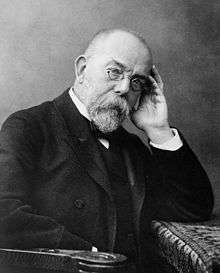
- 1804: Morphine first isolated.
- 1842: Anesthesia used for the first time.
- 1847: Chloroform invented for the first time, given to Queen Victoria at the birth of her eighth child, Prince Leopold in 1853
- 1855: Cocaine is isolated by Friedrich Gaedcke.
- 1885: Louis Pasteur creates the first successful vaccine against rabies for a young boy who had been bitten 14 times by a rabid dog.
- 1889: Aspirin patented.
Inventions
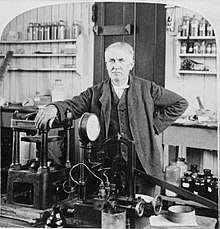
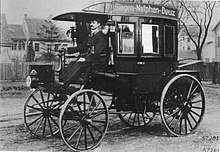
- 1804: First steam locomotive begins operation.
- 1825: Erie Canal opened connecting the Great Lakes to the Atlantic Ocean.
- 1825: First isolation of aluminium.
- 1825: The Stockton and Darlington Railway, the first public railway in the world, is opened.
- 1826: Samuel Morey patents the internal combustion engine.
- 1829: First electric motor built.
- 1837: Telegraphy patented.
- 1841: The word "dinosaur" is coined by Richard Owen
- 1844: First publicly funded telegraph line in the world—between Baltimore and Washington—sends demonstration message on 24 May, ushering in the age of the telegraph. This message read "What hath God wrought?" (Bible, Numbers 23:23)
- 1849: The safety pin and the gas mask are invented.
- 1855: Bessemer process enables steel to be mass-produced.
- 1856: World's first oil refinery in Romania
- 1858: Invention of the phonautograph, the first true device for recording sound.
- 1860: Benjamin Tyler Henry invents the 16 - shot Henry Rifle
- 1861: Richard Gatling invents the Gatling Gun,first modern machine gun used notably in the battles of Cold Harbor and Petersburg
- 1862: First meeting in combat of ironclad warships, USS Monitor and CSS Virginia, during the American Civil War.
- 1863: First section of the London Underground opens.
- 1866: Successful transatlantic telegraph cable follows an earlier attempt in 1858.
- 1867: Alfred Nobel invents dynamite.
- 1869: First Transcontinental Railroad completed in United States on 10 May.
- 1870: Rasmus Malling-Hansen's invention the Hansen Writing Ball becomes the first commercially sold typewriter.
- 1873: Blue jeans and barbed wire are invented.
- 1877: Thomas Edison invents the phonograph
- 1878: First commercial telephone exchange in New Haven, Connecticut.
- c. 1875/1880: Introduction of the widespread use of electric lighting. These included early crude systems in France and the UK and the introduction of large scale outdoor arc lighting systems by 1880.[21]
- 1879: Thomas Edison patents a practical incandescent light bulb.
- 1882: Introduction of large scale electric power utilities with the Edison Holborn Viaduct (London) and Pearl Street (New York) power stations supplying indoor electric lighting using Edison's incandescent bulb.[22][23]
- 1884: Sir Hiram Maxim invents the first self-powered Machine gun.
- 1885: Singer begins production of the 'Vibrating Shuttle'. which would become the most popular model of sewing machine.
- 1886: Karl Benz sells the first commercial automobile.
- 1890: The cardboard box is invented.
- 1892: John Froelich develops and constructs the first gasoline/petrol-powered tractor.
- 1894: Karl Elsener invents the Swiss Army knife.
- 1894: First gramophone record.
- 1895: Wilhelm Röntgen identifies x-rays.
Religion
- 1830: The Church of Jesus Christ of Latter Day Saints is established on 6 April 1830.
- 1844: Persian Prophet the Báb announces his revelation on 23 May, founding Bábism. He announced to the world of the coming of "He whom God shall make manifest". He is considered the forerunner of Bahá'u'lláh, the founder of the Bahá'í Faith.
- 1871–1878: In Germany, Otto von Bismarck challenged the Catholic Church in the Kulturkampf ("Culture War")
- 1879: Mary Baker Eddy founds the Church of Christ, Scientist.
- 1889: Mirza Ghulam Ahmad establishes the Ahmadiyya Muslim Community, a reform sect of Islam.
- 1891: Pope Leo XIII launches the encyclical Rerum novarum, the first major Catholic document on social justice
Culture
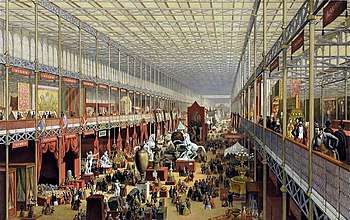
- 1808: Beethoven composes Fifth Symphony
- 1813: Jane Austen publishes Pride and Prejudice
- 1818: Mary Shelley publishes Frankenstein.
- 1819: John Keats writes his odes of 1819.
- 1819: Théodore Géricault paints his masterpiece The Raft of the Medusa, and exhibits it in the French Salon of 1819 at the Louvre.
- 1824: Premiere of Beethoven's Ninth Symphony.
- 1829: Johann Wolfgang von Goethe's Faust premieres.
- 1837: Charles Dickens publishes Oliver Twist.
- 1841: Ralph Waldo Emerson publishes Self-Reliance.
- 1845: Frederick Douglass publishes Narrative of the Life of Frederick Douglass, an American Slave.
- 1847: The Brontë sisters publish Jane Eyre, Wuthering Heights and Agnes Grey.
- 1849: Josiah Henson publishes The Life of Josiah Henson, Formerly a Slave, Now an Inhabitant of Canada, as Narrated by Himself.
- 1851: Herman Melville publishes Moby-Dick.
- 1851: Sojourner Truth delivers the speech Ain't I a Woman?.
- 1852: Harriet Beecher Stowe publishes Uncle Tom's Cabin.
- 1855: Walt Whitman publishes the first edition of Leaves of Grass.
- 1855: Frederick Douglass publishes the first edition of My Bondage and My Freedom.
- 1862: Victor Hugo publishes Les Misérables.
- 1865: Lewis Carroll publishes Alice's Adventures in Wonderland.
- 1869: Leo Tolstoy publishes War and Peace.
- 1875: Georges Bizet's opera Carmen premiers in Paris.
- 1876: Richard Wagner's Ring Cycle is first performed in its entirety.
- 1883: Robert Louis Stevenson's Treasure Island is published.
- 1884: Mark Twain publishes the Adventures of Huckleberry Finn.
- 1886: "Strange Case of Dr Jekyll and Mr Hyde" by Robert Louis Stevenson is published.
- 1887: Sir Arthur Conan Doyle publishes his first Sherlock Holmes story, A Study in Scarlet.
- 1889: Vincent van Gogh paints Starry Night.
- 1889: Moulin Rouge opens in Paris.
- 1892: Tchaikovsky's Nutcracker Suite premières in St Petersberg.
- 1894: Rudyard Kipling's The Jungle Book is published
- 1895: Trial of Oscar Wilde and premiere of his play The Importance of Being Earnest.
- 1897: Bram Stoker writes Dracula.
- 1900: L. Frank Baum publishes The Wonderful Wizard of Oz.
_-_Portrait_of_Leo_Tolstoy_(1887).jpg)
Literature
On the literary front the new century opens with romanticism, a movement that spread throughout Europe in reaction to 18th-century rationalism, and it develops more or less along the lines of the Industrial Revolution, with a design to react against the dramatic changes wrought on nature by the steam engine and the railway. William Wordsworth and Samuel Taylor Coleridge are considered the initiators of the new school in England, while in the continent the German Sturm und Drang spreads its influence as far as Italy and Spain. French arts had been hampered by the Napoleonic Wars but subsequently developed rapidly. Modernism began.[24]
The Goncourts and Émile Zola in France and Giovanni Verga in Italy produce some of the finest naturalist novels. Italian naturalist novels are especially important in that they give a social map of the new unified Italy to a people that until then had been scarcely aware of its ethnic and cultural diversity. There was a huge literary output during the 19th century. Some of the most famous writers included the Russians Alexander Pushkin, Nikolai Gogol, Leo Tolstoy, Anton Chekhov and Fyodor Dostoyevsky; the English Charles Dickens, John Keats, Alfred, Lord Tennyson and Jane Austen; the Scottish Sir Walter Scott; the Irish Oscar Wilde; the Americans Edgar Allan Poe, Ralph Waldo Emerson, and Mark Twain; and the French Victor Hugo, Honoré de Balzac, Jules Verne, Alexandre Dumas and Charles Baudelaire.[25]
Some American literary writers, poets and novelists were: Walt Whitman, Mark Twain, Harriet Ann Jacobs, Nathaniel Hawthorne, Ralph Waldo Emerson, Herman Melville, Frederick Douglass, Harriet Beecher Stowe, Joel Chandler Harris, and Emily Dickinson to name a few.
Photography
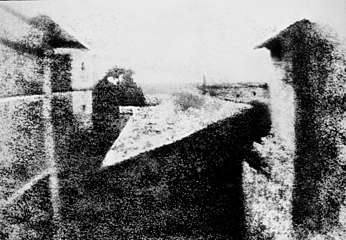
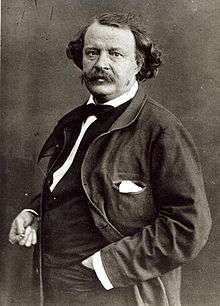
- Ottomar Anschütz, chronophotographer
- Mathew Brady, documented the American Civil War
- Edward S. Curtis, documented the American West notably Native Americans
- Louis Daguerre, inventor of daguerreotype process of photography, chemist
- Thomas Eakins, pioneer motion photographer
- George Eastman, inventor of roll film
- Hércules Florence, pioneer inventor of photography
- Auguste and Louis Lumière, pioneer film-makers, inventors
- Étienne-Jules Marey, pioneer motion photographer, chronophotographer
- Eadweard Muybridge, pioneer motion photographer, chronophotographer
- Nadar a.k.a. Gaspard-Félix Tournachon, portrait photographer
- Nicéphore Niépce, pioneer inventor of photography
- Louis Le Prince, motion picture inventor and pioneer film-maker
- Sergey Prokudin-Gorsky, chemist and photographer
- William Fox Talbot, inventor of the negative / positive photographic process.
Visual artists, painters, sculptors
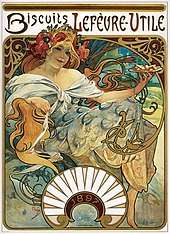
The Realism and Romanticism of the early 19th century gave way to Impressionism and Post-Impressionism in the later half of the century, with Paris being the dominant art capital of the world. In the United States the Hudson River School was prominent. 19th-century painters included:
- Ivan Aivazovsky
- Léon Bakst
- Albert Bierstadt
- William Blake
- Arnold Böcklin
- Rosa Bonheur
- William Burges
- Mary Cassatt
- Camille Claudel
- Paul Cézanne
- Frederic Edwin Church
- Thomas Cole
- Jan Matejko
- John Constable
- Camille Corot
- Gustave Courbet
- Honoré Daumier
- Edgar Degas
- Eugène Delacroix
- Thomas Eakins
- Caspar David Friedrich
- Paul Gauguin
- Théodore Géricault
- Vincent van Gogh
- William Morris
- Francisco Goya
- Andō Hiroshige
- Hokusai
- Winslow Homer
- Jean-Auguste-Dominique Ingres
- Isaac Levitan
- Édouard Manet
- Claude Monet
- Gustave Moreau
- Berthe Morisot
- Edvard Munch
- Mikhail Nesterov
- Camille Pissarro
- Augustus Pugin
- Pierre-Auguste Renoir
- Ilya Repin
- Auguste Rodin
- Albert Pinkham Ryder
- John Singer Sargent
- Valentin Serov
- Georges Seurat
- Ivan Shishkin
- Vasily Surikov
- James Tissot
- Henri de Toulouse-Lautrec
- Joseph Mallord William Turner
- Viktor Vasnetsov
- Eugène Viollet-le-Duc
- Mikhail Vrubel
- James Abbott McNeill Whistler
- Tsukioka Yoshitoshi
Music
Sonata form matured during the Classical era to become the primary form of instrumental compositions throughout the 19th century. Much of the music from the 19th century was referred to as being in the Romantic style. Many great composers lived through this era such as Ludwig van Beethoven, Franz Liszt, Frédéric Chopin, Pyotr Ilyich Tchaikovsky and Richard Wagner. The list includes:
- Mily Balakirev
- Ludwig van Beethoven
- Hector Berlioz
- Georges Bizet
- Alexander Borodin
- Johannes Brahms
- Anton Bruckner
- Frédéric Chopin
- Claude Debussy
- Antonín Dvořák
- Mikhail Glinka
- Edvard Grieg
- Scott Joplin
- Alexandre Levy
- Franz Liszt
- Gustav Mahler
- Felix Mendelssohn
- Modest Mussorgsky
- Jacques Offenbach
- Niccolò Paganini
- Nikolai Rimsky-Korsakov
- Gioachino Rossini
- Anton Rubinstein
- Camille Saint-Saëns
- Antonio Salieri
- Franz Schubert
- Robert Schumann
- Alexander Scriabin
- Arthur Sullivan
- Pyotr Ilyich Tchaikovsky
- Giuseppe Verdi
- Richard Wagner
Sports
- 1867: The Marquess of Queensberry Rules for boxing are published.
- 1872: The first recognised international soccer match, between England and Scotland, is played.
- 1877: The first test cricket match, between England and Australia, is played.
- 1891: Basketball is invented by James Naismith.
- 1895: Volleyball is invented.
- 1896: Olympic Games revived in Athens.
Events
1801–1850
- 1801: The Kingdom of Great Britain and the Kingdom of Ireland merge to form the United Kingdom.
- 1803: William Symington demonstrates his Charlotte Dundas, the "first practical steamboat".
- 1803: The Wahhabis of the First Saudi State capture Mecca and Medina.
- 1804: Austrian Empire founded by Francis I.
- 1804: World population reaches 1 billion.
- 1805: The Battle of Trafalgar eliminates the French and Spanish naval fleets and allows for British dominance of the seas, a major factor for the success of the British Empire later in the century.
- 1805–1848: Muhammad Ali modernizes Egypt.
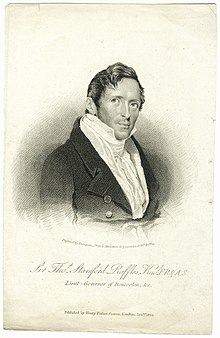
- 1810: The University of Berlin was founded. Among its students and faculty are Hegel, Marx, and Bismarck. The German university reform proves to be so successful that its model is copied around the world (see History of European research universities).
- 1814: Elisha Collier invents the Flintlock Revolver.
- 1814 : February 1 Eruption of Mayon Volcano
- 1815: April, Mount Tambora in Sumbawa island erupts, becoming the largest volcanic eruption in recorded history, destroying Tambora culture, and killing at least 71,000 people, including its aftermath. The eruption created global climate anomalies known as "volcanic winter".[26]
- 1816: Year Without a Summer: Unusually cold conditions wreak havoc throughout the Northern Hemisphere, likely influenced by the 1815 explosion of Mount Tambora.
- 1816–1828: Shaka's Zulu Kingdom becomes the largest in Southern Africa.
- 1819: The modern city of Singapore is established by the British East India Company.
- 1820: Discovery of Antarctica.
- 1820: Liberia founded by the American Colonization Society for freed American slaves.
- 1820: Dissolution of the Maratha Empire.
- 1821–1823: First Mexican Empire, as Mexico's first post-independent government, ruled by Emperor Agustín I of Mexico.
- 1823: Monroe Doctrine declared by US President James Monroe.
- 1825: The Decembrist revolt.
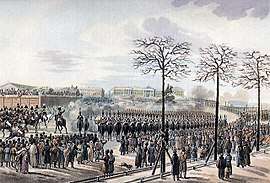
- 1829: Sir Robert Peel founds the Metropolitan Police Service, the first modern police force.
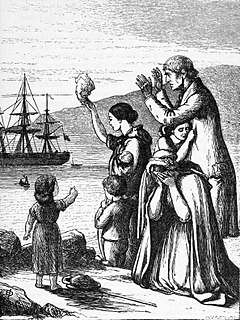
- 1830: Anglo-Russian rivalry over Afghanistan, the Great Game, commences and concludes in 1895.
- 1831: November Uprising ends with crushing defeat for Poland in the Battle of Warsaw.
- 1832: The British Parliament passes the Great Reform Act.
- 1834–1859: Imam Shamil's rebellion in Russian-occupied Caucasus.
- 1835–1836: The Texas Revolution in Mexico resulted in the short-lived Republic of Texas.
- 1836: Samuel Colt popularizes the revolver and sets up a firearms company to manufacture his invention of the Colt Paterson revolver a six bullets firearm shot one by one without reloading manually.
- 1837–1838: Rebellions of 1837 in Canada.
- 1838: By this time, 46,000 Native Americans have been forcibly relocated in the Trail of Tears.
- 1839–1860: After the First and Second Opium Wars, France, the United Kingdom, the United States and Russia gain many trade and associated concessions from China resulting in the start of the decline of the Qing dynasty.
- 1839–1919: Anglo-Afghan Wars lead to stalemate and the establishment of the Durand line
- 1842: Treaty of Nanking cedes Hong Kong to the British.
- 1843: The first wagon train sets out from Missouri.
- 1844: Rochdale Society of Equitable Pioneers establish what is considered the first cooperative in the world.
- 1845–1849: The Irish Potato Famine leads to the Irish diaspora.
- 1848: The Communist Manifesto published.
- 1848: Seneca Falls Convention is the first women's rights convention in the United States and leads to the battle for women's suffrage.
- 1848–1858: California Gold Rush.
- 1849: Earliest recorded air raid, as Austria employs 200 balloons to deliver ordnance against Venice.
- 1850: The Little Ice Age ends around this time.
- 1850: Franz Hermann Schulze-Delitzsch establishes the first cooperative financial institution.
1851–1900
- 1851: The Great Exhibition in London was the world's first international Expo or World Fair.
- 1852: Frederick Douglass delivers his speech "The Meaning of July Fourth for the Negro" in Rochester, New York.
- 1857: Sir Joseph Whitworth designs the first long-range sniper rifle.
- 1857–1858: Indian Rebellion of 1857. The British Empire assumes control of India from the East India Company.
- 1858: Construction of Big Ben is completed.
- 1859–1869: Suez Canal is constructed.
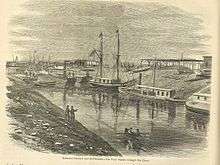
- 1860: Giuseppe Garibaldi launches the Expedition of the Thousand.
- 1861: Russia abolishes serfdom.
- 1862–1877: Muslim Rebellion in north-west China.
- 1863: Formation of the International Red Cross is followed by the adoption of the First Geneva Convention in 1864.
- 1865–1877: Reconstruction in the United States; Slavery is banned in the United States by the Thirteenth Amendment to the United States Constitution.
- 1868: Michael Barrett is the last person to be publicly hanged in England.
- 1869: The Suez Canal opens linking the Mediterranean to the Red Sea.


- 1870: Official dismantling of the Cultivation System and beginning of a 'Liberal Policy' of deregulated exploitation of the Netherlands East Indies.[27]
- 1870–1890: Long Depression in Western Europe and North America.
- 1871–1872: Famine in Persia is believed to have caused the death of 2 million.
- 1871: The Paris Commune briefly rules the French capital.
- 1872: Yellowstone National Park, the first national park, is created.
- 1874: The Société Anonyme Coopérative des Artistes Peintres, Sculpteurs, and Graveurs, better known as the Impressionists, organize and present their first public group exhibition at the Paris studio of the photographer Nadar.
- 1874: The Home Rule Movement is established in Ireland.
- 1875: HMS Challenger surveys the deepest point in the Earth's oceans, the Challenger Deep
- 1876: Battle of the Little Bighorn leads to the death of General Custer and victory for the alliance of Lakota, Cheyenne and Arapaho
- 1876–1914: The massive expansion in population, territory, industry and wealth in the United States is referred to as the Gilded Age.
- 1877: Great Railroad Strike in the United States may have been the world's first nationwide labour strike.
- 1881: Wave of pogroms begins in the Russian Empire.
- 1881–1882: The Jules Ferry laws are passed in France establishing free, secular education.
- 1883: Krakatoa volcano explosion, one of the largest in modern history.
- 1883: The quagga is rendered extinct.
- 1886: Construction of the Statue of Liberty; Coca-Cola is developed.
- 1888: Founding of the shipping line Koninklijke Paketvaart-Maatschappij (KPM) that supported the unification and development of the colonial economy.[27]
- 1889: Eiffel Tower is inaugurated in Paris.
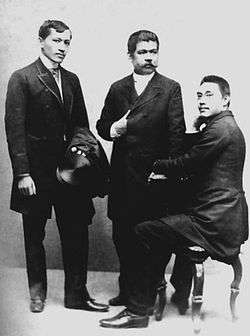
- 1889: Brazil A republican military coup established the Brazilian republic. The parliamentary constitutional monarchy is abolished.
- 1890: First use of the electric chair as a method of execution.
- 1892: The World's Columbian Exposition was held in Chicago celebrating the 400th anniversary of Christopher Columbus's arrival in the New World.
- 1892: Fingerprinting is officially adopted for the first time.
- 1893: New Zealand becomes the first country to enact women's suffrage.
- 1893: The Coremans-de Vriendt law is passed in Belgium, creating legal equality for French and Dutch languages.
- 1894: Lombok War[27] The Dutch looted and destroyed the Cakranegara palace of Mataram.[28] J. L. A. Brandes, a Dutch philologist discovered and secured Nagarakretagama manuscript in Lombok royal library.
- 1896: Philippine Revolution ends declaring Philippines free from Spanish rule.
- 1898: The United States gains control of Cuba, Puerto Rico, and the Philippines after the Spanish–American War.
- 1898: Empress Dowager Cixi of China engineers a coup d'état, marking the end of the Hundred Days' Reform; the Guangxu Emperor is arrested.
- Exposition Universelle held in Paris, prominently featuring the growing art trend Art Nouveau.
- Eight nations invaded China at the same time and ransacked Forbidden City.
Significant people
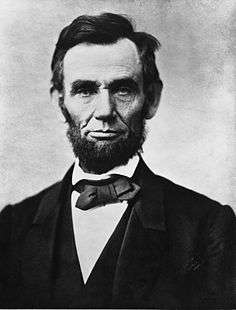
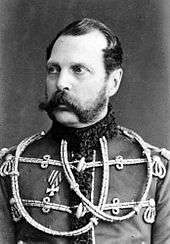
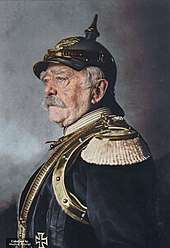
- Charles Alderton, creator of Dr Pepper
- Frederick Douglass, Abolitionist, statesman, orator, newspaper editor, United States Minister Resident to Haiti
- Alexander II, Emperor of Russia, King of Poland
- Clara Barton, nurse, pioneer of the American Red Cross
- Sitting Bull, a leader of the Lakota
- Bahadur Shah Zafar, last mughal emperor and leader of 1857 mutiny.
- Toussaint Louverture, Revolutionary and military leader, central figure of the Haitian Revolution
- John Burroughs, Naturalist, conservationist, writer
- Benito Juárez, Mexican President
- Shaka kaSenzangakhona, Monarch of the Zulu Kingdom
- Davy Crockett, King of the wild frontier, folk hero, frontiersman, soldier and politician
- Jefferson Davis, Confederate States President
- Harriet Tubman, abolitionist and political activist.
- William Gilbert Grace, English cricketer
- Emilio Aguinaldo, A Filipino revolutionary, politician, and military leader
- Baron Haussmann, civic planner
- John Brown (abolitionist),
- Franz Joseph I of Austria, Emperor of Austria and brother of Mexican Emperor
- Chief Joseph, a leader of the Nez Percé
- Kamehameha I, founder of the Kingdom of Hawaii died in May 1819
- Ned Kelly, Australian folk hero, and outlaw
- Elizabeth Kenny, Australian Nurse and found an Innovative Treatment of Polio
- Sándor Kőrösi Csoma, explorer of the Tibetan culture
- Abraham Lincoln, United States President
- Fitz Hugh Ludlow, writer and explorer
- William McKinley, 25th U.S. President
- John Muir, Naturalist, writer, preservationist
- Florence Nightingale, nursing pioneer
- Nat Turner, Slave rebellion leader
- Ranjit Singh, Maharaja of the Sikh Empire
- Napoleon I, First Consul and Emperor of the French
- Charles Stewart Parnell, Irish political leader
- Commodore Perry, U.S. Naval commander, opened the door to Japan
- José Rizal, Filipino polymath, physician, nationalist, novelist, poet, liberator
- Sacagawea, Important aide to the Lewis and Clark Expedition
- Giuseppe Garibaldi, was an Italian general and politician, a central figure in the Italian Risorgimento
- Ignaz Semmelweis, proponent of hygienic practices
- Dr. John Snow, the founder of epidemiology
- F R Spofforth, Australian cricketer
- Queen Victoria, Queen of the United Kingdom
- King Victor Emmanuel II, first King of Italy
- William Wilberforce, Abolitionist, Philanthropist
- Hong Xiuquan inspired China's Taiping Rebellion, perhaps the bloodiest civil war in human history
- Karl Marx wrote The Communist Manifesto, promoted the abolition of capitalism through international revolution.
- Nikola Karev commander and leader of the Ilinden Uprising in Ottoman-Macedonia.
- Henry George, economist and author of Progress and Poverty, one of the most influential books of the 19th century in the United States
- Nabi Tajima, last verified surviving person born in the 19th century, died in 2018.
Show business and theatre
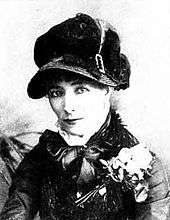
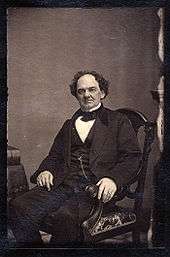
- P. T. Barnum, showman
- David Belasco, actor, playwright, theatrical producer
- Sarah Bernhardt, actress
- Edwin Booth, actor
- John Wilkes Booth, actor, assassin of Abraham Lincoln
- Dion Boucicault, playwright
- Mrs Patrick Campbell, actress
- Anton Chekhov, playwright
- Buffalo Bill Cody, Wild West legend, and showman
- Baptiste Deburau, Bohemian–French actor and mime.
- Sergei Diaghilev, art critic, ballet impresario
- Eleonora Duse, actress
- Henrik Ibsen, playwright
- Edmund Kean, actor
- Charles Kean, actor
- Olga Knipper, actress
- Lillie Langtry, actress, socialite
- Frédérick Lemaître, actor
- Jenny Lind, opera singer called the Swedish Nightingale
- William Macready, actor
- Céleste Mogador, dancer
- Lola Montez, exotic dancer
- Adelaide Neilson, actress
- Vladimir Nemirovich-Danchenko, playwright, theatre director, co-founder of Moscow Art Theatre
- Annie Oakley, Wild West, sharp-shooter
- Alexander Ostrovsky, playwright
- Lillian Russell, singer, actress
- George Bernard Shaw, playwright
- Mikhail Shchepkin, actor
- Konstantin Stanislavski, actor, theatre director, co-founder of Moscow Art Theatre
- Edward Askew Sothern, actor
- Ellen Terry, actress
- Maria Yermolova, actress
Business
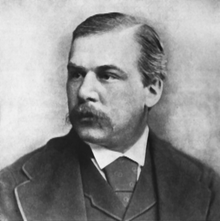
- John Jacob Astor III, Real Estate
- Andrew Carnegie, Industrialist, philanthropist
- Robert Reed Church, a freedman who became the South's first black millionaire, real estate
- Jay Cooke, Finance
- Henry Clay Frick, Industrialist, art collector
- Jay Gould, Railroad developer
- Meyer Guggenheim Family patriarch, mining
- Daniel Guggenheim (copper)
- E. H. Harriman, Railroads
- Henry O. Havemeyer (sugar), art collector
- George Hearst, Gold
- James J. Hill (railroads) – The Empire Builder
- Thomas Lipton, Scottish merchant and yachtsman known for Lipton tea
- Savva Mamontov, Industrialist, philanthropist
- Andrew W. Mellon, Industrialist, philanthropist, art collector
- J. P. Morgan, Banker, art collector
- George Mortimer Pullman (railroads)
- Ludvig Nobel, Oil
- Charles Pratt Oil, founder of the Pratt Institute
- Cecil Rhodes diamonds, mining magnate, founder of De Beers and benefactor of the Rhodes Scholarship.
- John D. Rockefeller, Oil, Business tycoon, philanthropist
- Levi Strauss, clothing manufacturer
- Pavel Tretyakov, Businessman, art collector, philanthropist, founder of Tretyakov Gallery
- Cornelius Vanderbilt, Shipping, Railroads
- William Chapman Ralston, Businessman, Financier, founder of Bank of California.
- Madam C.J. Walker, African American entrepreneur, philanthropist, political and social activist. Eulogized as first female self-made millionaire in America.
Anthropology, archaeology, scholars
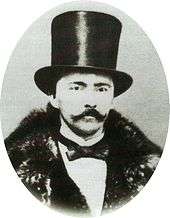
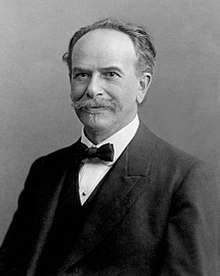
- Churchill Babington, Archaeology
- Adolph Francis Alphonse Bandelier, Archaeology
- Franz Boas, Anthropology
- Charles Étienne Brasseur de Bourbourg, Archaeology
- Louis Agassiz Fuertes, Ornithology
- George Bird Grinnell, Anthropology
- Joseph LeConte, Scholar, preservationist
- Nicholai Miklukho-Maklai, Anthropology
- Clinton Hart Merriam, Zoology
- Lewis H. Morgan, Anthropology
- Jules Étienne Joseph Quicherat, Archaeology
- Robert Ridgway, Ornithology
- Edward Burnett Tylor, Anthropology
- Karl Verner, Linguist
Journalists, missionaries, explorers
- Roald Amundsen, explorer
- Samuel Baker, explorer
- Thomas Baines, artist, explorer
- Heinrich Barth, explorer
- Henry Walter Bates, naturalist, explorer
- Fabian Gottlieb von Bellingshausen, explorer
- Jim Bridger, explorer
- Richard Francis Burton, explorer
- William Clark, explorer
- The Lewis and Clark Expedition, exploration
- Frederick Samuel Dellenbaugh, explorer
- Percy Fawcett, adventurer, explorer, proto-Indiana Jones
- Vladimir Gilyarovsky, journalist
- Horace Greeley, journalist
- Peter Jones (missionary), Canadian Methodist minister, and go-between for Christians and his fellow Mississaugas and other Indian tribes.
- Adoniram Judson, missionary
- Sir John Kirk, explorer, physician, companion of David Livingston
- Sir Joseph Dalton Hooker, botanist, explorer, friend of Charles Darwin
- Sir William Jackson Hooker, botanist, explorer, father of Sir Joseph Dalton Hooker
- Otto von Kotzebue, explorer
- Pyotr Kozlov, explorer
- Mikhail Lazarev, fleet commander, explorer
- Meriwether Lewis, explorer
- David Livingstone, missionary
- Stepan Makarov, explorer, oceanographer
- Thomas Nast, journalist, caricaturist and editorial cartoonist
- Robert Peary, explorer
- Marcelo H. del Pilar, writer, journalist, editor of La Solidaridad.
- Nikolai Przhevalsky, explorer
- Frederick Selous, explorer
- Pyotr Semyonov-Tyan-Shansky, explorer, geographer
- John Hanning Speke, explorer
- Henry M. Stanley, journalist, explorer
- John McDouall Stuart, explorer
- John L. O'Sullivan, journalist who coined Manifest Destiny
- Shoqan Walikhanov, explorer ethnographer, historian
- Carter G. Woodson, African-American historian, author, journalist and the founder of the Association for the Study of African American Life and History.
- Ferdinand von Wrangel, explorer
Philosophy and religion
The 19th century was host to a variety of religious and philosophical thinkers, including:
- Mirza Ghulam Ahmad founded the Ahmadiyya Islamic movement in India.
- Bahá'u'lláh founded the Bahá'í Faith in Persia
- Mikhail Bakunin, anarchist
- William Booth, social reformer, founder of the Salvation Army
- Auguste Comte, philosopher
- Mary Baker Eddy, religious leader, founder of Christian Science
- Friedrich Engels, political philosopher
- Georg Wilhelm Friedrich Hegel, philosopher
- Allan Kardec, systematizer of the Spiritist Doctrine
- Søren Kierkegaard, philosopher
- Peter Kropotkin, anarchist
- Karl Marx, political philosopher
- Pierre-Joseph Proudhon, Mutualist anarchist
- John Stuart Mill, philosopher
- Krste Petkov Misirkov, philosopher and historian
- William Morris, social reformer
- Friedrich Nietzsche, philosopher
- Nikolai (Nicholas) of Japan, religious leader, introduced Eastern Orthodoxy into Japan
- Ramakrishna Paramahamsa, Hindu mystic
- Claude Henri de Rouvroy, Comte de Saint-Simon, founder of French socialism
- Arthur Schopenhauer, philosopher
- Joseph Smith, Jr. and Brigham Young, founders of Mormonism
- Vladimir Solovyov, philosopher
- Herbert Spencer, "The Great philosopher"
- Charles Spurgeon, Baptist preacher and writer
- Leo Tolstoy, anarchist
- Ayya Vaikundar, initiator of the belief system of Ayyavazhi
- Ellen White religious author and co-founder of the Seventh-day Adventist Church
- St. Thérèse of Lisieux, French discalced Carmelite nun
Politics and the military
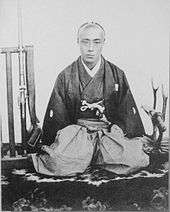
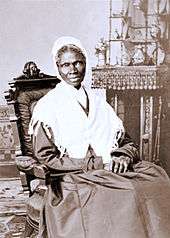
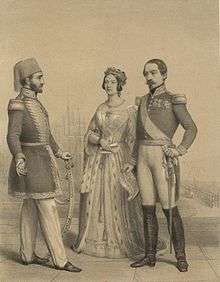
- John Quincy Adams, U.S. congressman, lawyer, and president
- Alexander I of Russia
- Alexander III of Russia
- Susan B. Anthony, U.S. women's rights advocate
- Pyotr Bagration, Russian general
- Otto von Bismarck, German chancellor
- Napoleon Bonaparte, French general, first consul and emperor
- William Wells Brown, American abolitionist, novelist, playwright, and historian
- John C. Calhoun, U.S. senator
- Henry Clay, U.S. statesman, "The Great Compromiser"
- Jefferson Davis, President of the Confederate States of America
- Louis-Nicolas Davout, French general
- Benjamin Disraeli, novelist and politician
- Frederick Douglass, U.S. abolitionist spokesman
- Ferdinand VII of Spain
- Joseph Fouché, French politician
- John C. Frémont, Explorer, Governor of California
- Giuseppe Garibaldi, unifier of Italy and Piedmontese soldier
- Alexander Gorchakov, Russian Chancellor
- Isabella II of Spain
- Gojong of Joseon, Korean emperor
- William Lloyd Garrison, U.S. abolitionist leader
- William Ewart Gladstone, British prime minister
- Ulysses S. Grant, U.S. general and president
- Theodor Herzl, founder of modern political Zionism
- Andrew Jackson, U.S. general and president
- Thomas Jefferson, American statesman, philosopher, and president
- John Mitchell, Jr., American businessman, newspaper editor, activist, and politician
- Ioannis Kapodistrias, Russian and Greek statesman
- Lajos Kossuth, Hungarian governor; leader of the war of independence
- Mikhail Kutuzov, Russian general
- Robert E. Lee, Confederate general
- Libertadores, Latin American liberators
- Abraham Lincoln, U.S. president; led the nation during the American Civil War
- Sir John A. Macdonald, Canada, first Prime Minister of Canada
- Klemens von Metternich, Austrian Chancellor
- Joachim Murat, King of Naples and French general
- Meiji Emperor of Japan
- Napoleon III
- Michel Ney, French general
- Nicholas I of Russia
- Pedro II of Brazil
- Józef Poniatowski, Polish general
- Cecil Rhodes
- John Ross Robertson, newspaper publisher and philanthropist
- Theodore Roosevelt, Explorer, Naturalist, future President of The United States
- William Tecumseh Sherman, Union general during the American Civil War
- Dred Scott, enslaved African American man
- Fulwar Skipwith, the first and only president of the short lived Republic of West Florida
- Mikhail Skobelev, Russian general
- Leland Stanford, Governor of California, U.S. Senator, entrepreneur
- István Széchenyi, aristocrat, leader of the Hungarian reform movement
- Charles Maurice de Talleyrand, French politician
- Harriet Tubman, African-American abolitionist, humanitarian, played a part in the Underground Railroad
- Sojourner Truth, was an African-American abolitionist and women's rights activist
- William M. Tweed, a.k.a. Boss Tweed, influential New York City politician, head of Tammany Hall
- Abdülmecid I, 31st Sultan and 110th Caliph of Islam of the Ottoman Empire
- Queen Victoria, British monarch
- Arthur Wellesley, 1st Duke of Wellington, British General and prime minister
- Hong Xiuquan, revolutionary, self-proclaimed Son of God
- Victoria Woodhull, American politician, suffragette, abolitionist
- Tokugawa Yoshinobu, the last Japanese shōgun
- Sultan Abu Bakar of Johor, Johore Sultan
- Andres Bonifacio, Filipino revolutionary leader
Composers
- Ludwig Van Beethoven
- Franz Schubert
- George Bridgetower
- Gioachino Rossini
- Frédéric Chopin
- Hector Berlioz
- Franz Liszt
- Felix Mendelssohn
- Robert Schuman
- Johannes Brahms
- Stephen Foster
- Carl Maria von Weber
- Johann Strauss
- Modest Mussorgsky
- Pyotr Ilyich Tchaikovsky
- Johann Strauss
- Gustav Mahler
- Nikolai Rimsky-Korsakov
- Richard Strauss
- Richard Wagner
Supplementary portrait gallery
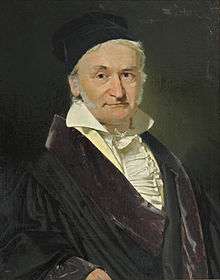
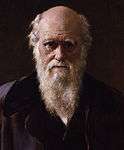
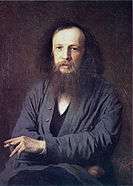
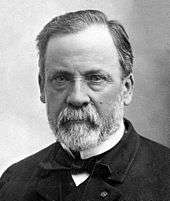 Louis Pasteur, 1878
Louis Pasteur, 1878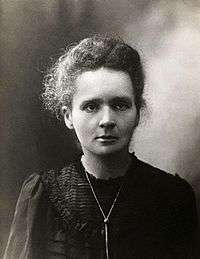 Marie Curie, c. 1898
Marie Curie, c. 1898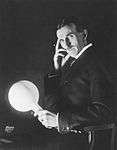
_2.jpg)
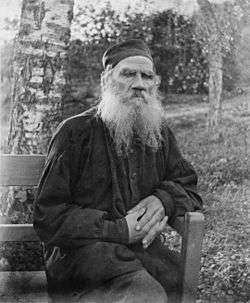 Leo Tolstoy c. 1897
Leo Tolstoy c. 1897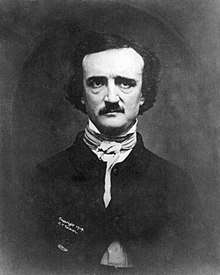
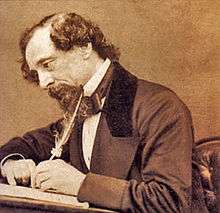
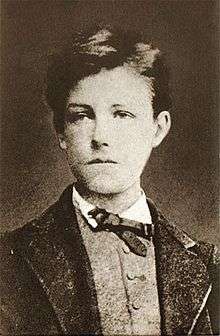 Arthur Rimbaud c. 1872
Arthur Rimbaud c. 1872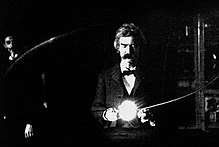 Mark Twain, 1894
Mark Twain, 1894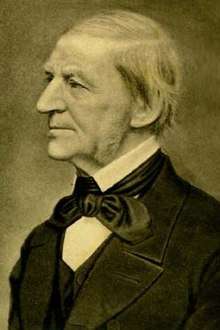
 Henry David Thoreau, August 1861.
Henry David Thoreau, August 1861.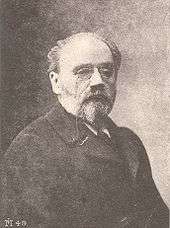 Émile Zola, c. 1900
Émile Zola, c. 1900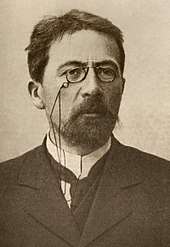
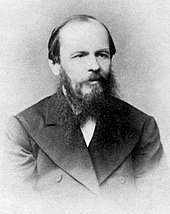 Fyodor Dostoevsky, 1876
Fyodor Dostoevsky, 1876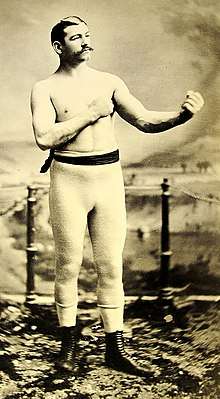 John L Sullivan in his prime, c. 1882
John L Sullivan in his prime, c. 1882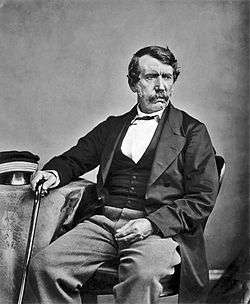
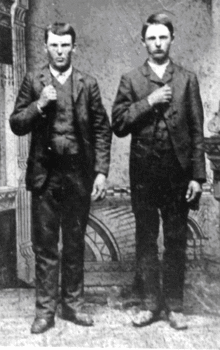 Jesse and Frank James, 1872
Jesse and Frank James, 1872_edit.jpg) Sitting Bull and Buffalo Bill Cody, Montreal, Quebec, 1885
Sitting Bull and Buffalo Bill Cody, Montreal, Quebec, 1885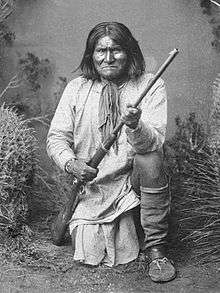
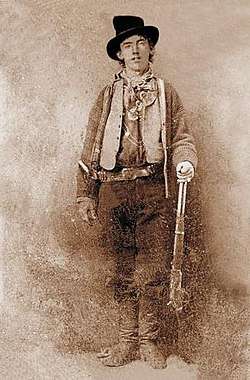 William Bonney aka Henry McCarty aka Billy the Kid, c. late 1870s
William Bonney aka Henry McCarty aka Billy the Kid, c. late 1870s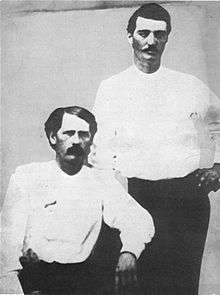 Deputies Bat Masterson and Wyatt Earp in Dodge City, 1876
Deputies Bat Masterson and Wyatt Earp in Dodge City, 1876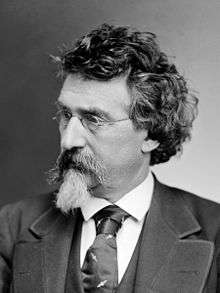 Mathew Brady, Self-portrait, c. 1875
Mathew Brady, Self-portrait, c. 1875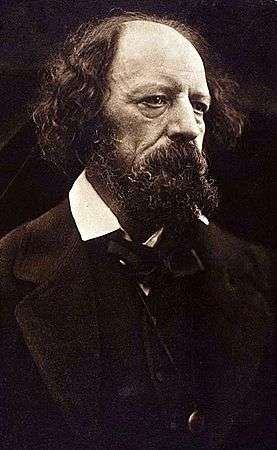
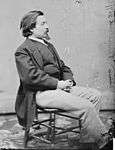 Thomas Nast, c. 1860–1875, photo by Mathew Brady or Levin Handy
Thomas Nast, c. 1860–1875, photo by Mathew Brady or Levin Handy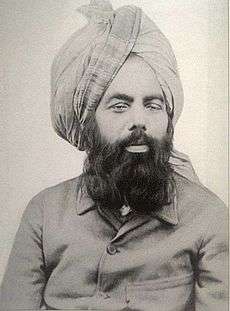
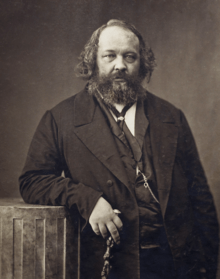

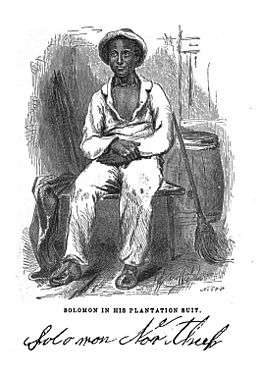
.jpg)
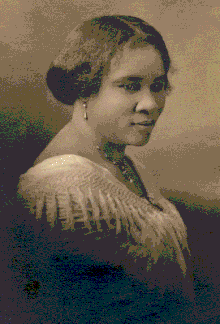

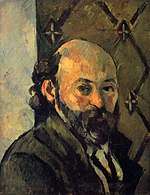 Paul Cézanne, self-portrait, 1880–1881
Paul Cézanne, self-portrait, 1880–1881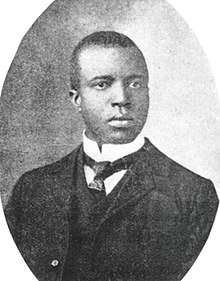
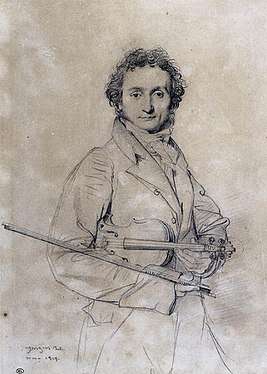 Niccolò Paganini, c.1819
Niccolò Paganini, c.1819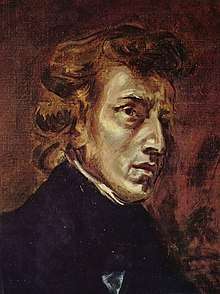 Frédéric Chopin, 1838
Frédéric Chopin, 1838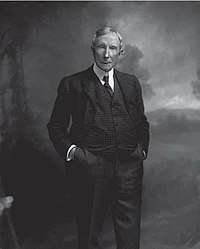
See also
- Timeline of modern history
- Long nineteenth century
- 19th century in film
- 19th century in games
- 19th-century philosophy
- Capitalism in the nineteenth century
- France in the nineteenth century
- International relations of the Great Powers (1814–1919)
- List of wars 1800–1899
- Mid-nineteenth-century Spain
- Nineteenth-century theatre
- Russian history, 1855–1892
- Slavery in the United States
- Timeline of 19th-century Muslim history
- Timeline of historic inventions#19th century
- Victorian era
References
- "The First Telephone Call". www.americaslibrary.gov. Archived from the original on 2015-10-22. Retrieved 2015-10-25.
- "Dec. 18, 1878: Let There Be Light — Electric Light". WIRED. 18 December 2009. Archived from the original on 21 October 2016. Retrieved 4 March 2017.
- Encyclopædia Britannica's Great Inventions. Encyclopædia Britannica.
- "The United States and the Industrial Revolution in the 19th Century". Americanhistory.about.com. 2012-09-18. Archived from the original on 2012-07-23. Retrieved 2012-10-31.
- Laura Del Col, West Virginia University, The Life of the Industrial Worker in Nineteenth-Century England Archived 2008-03-13 at the Wayback Machine
- "Modernization – Population Change". Encyclopædia Britannica. Archived from the original on April 6, 2009.
- Liberalism in the 19th century Archived 2009-02-18 at the Wayback Machine. Encyclopædia Britannica.
- Sailing against slavery. By Jo Loosemore Archived 2009-01-08 at the Wayback Machine. BBC.
- The Atlantic: Can the US afford immigration? Archived 2010-07-04 at the Wayback Machine. Migration News. December 1996.
- Perez-Brignoli, Hector (1989). A Brief History of Central America. University of California Press. ISBN 978-0520909762.
- R.J.W. Evans and Hartmut Pogge von Strandmann, eds., The Revolutions in Europe 1848–1849 (2000) pp. v, 4
- "The Emancipation Proclamation". National Archives. October 6, 2015. Archived from the original on February 6, 2017. Retrieved February 15, 2017.
- McPherson, J. M. (2014). Emancipation Proclamation and Thirteenth Amendment. In E. Foner, & J. A. Garraty (Eds.), The Reader's companion to American history. Boston, MA: Houghton Mifflin. Retrieved from http://search.credoreference.com/content/entry/rcah/emancipation_proclamation_and_thirteenth_amendment/0 Archived 2018-11-06 at the Wayback Machine
- "13th Amendment to the U.S. Constitution: Abolition of Slavery". National Archives. January 27, 2016. Archived from the original on February 16, 2017. Retrieved February 15, 2017.
- Reilly, Thomas H. (2004). The Taiping heavenly kingdom rebellion and the blasphemy of empire (1 ed.). Seattle: University of Washington Press. ISBN 978-0295801926.
- W. G. Beasley, The Meiji Restoration (1972),
- Kerr, Gordon (2012). A Short History of Africa: From the Origins of the Human Race to the Arab Spring. Harpenden, Herts [UK]: Pocket Essentials. pp. 85–101. ISBN 9781842434420.
- "Killing ground: photographs of the Civil War and the changing American landscape Archived 2017-02-28 at the Wayback Machine". John Huddleston (2002). Johns Hopkins University Press. ISBN 0-8018-6773-8
- Snyder, Laura J. (2000-12-23). "William Whewell". Stanford University. Archived from the original on 2010-01-04. Retrieved 2008-03-03. Cite journal requires
|journal=(help) - "Multidrug-Resistant Tuberculosis". Centers for Disease Control and Prevention. 2018-12-31. Archived from the original on April 21, 2009.
- The First Form of Electric Light History of the Carbon Arc Lamp (1800 - 1980s)'.Edison Tech Center, edisontechcenter.org
- Jonathan Daly, The Rise of Western Power - A Comparative History of Western Civilization, Bloomsbury Publishing · 2013, page 310
- Turan Gonen, Electric Power Distribution Engineering, CRC Press · 2015, page 1
- David Damrosch and David L. Pike, eds. The Longman Anthology of World Literature, Volume E: The Nineteenth Century (2nd ed. 2008)
- M. H. Abrams et al., eds., The Norton Anthology of English Literature (9th ed. 2012)
- Oppenheimer, Clive (2003). "Climatic, environmental and human consequences of the largest known historic eruption: Tambora volcano (Indonesia) 1815". Progress in Physical Geography. 27 (2): 230–259. doi:10.1191/0309133303pp379ra.
- Vickers (2005), page xii
- Wahyu Ernawati: "Chapter 8: The Lombok Treasure", in Colonial collections Revisited: Pieter ter Keurs (editor) Vol. 152, CNWS publications. Issue 36 of Mededelingen van het Rijksmuseum voor Volkenkunde, Leiden. CNWS Publications, 2007. ISBN 978-90-5789-152-6. 296 pages. pp. 186–203
Further reading
- New Cambridge Modern History (13 vol 1957–79), old but thorough coverage, mostly of Europe; strong on diplomacy
- Bury, J. P. T. ed. The New Cambridge Modern History: Vol. 10: the Zenith of European Power, 1830–70 (1964) online
- Crawley, C. W., ed. The New Cambridge Modern History Volume IX War and Peace In An Age of Upheaval 1793–1830 (1965) online
- Darby, H. C. and H. Fullard The New Cambridge Modern History, Vol. 14: Atlas (1972)
- Hinsley, F.H., ed. The New Cambridge Modern History, vol. 11, Material Progress and World-Wide Problems 1870–1898 (1979) online
- Langer, William. An Encyclopedia of World History (5th ed. 1973); highly detailed outline of events online free
Diplomacy and international relations
- Aldrich, Robert (1996). Greater France. doi:10.1007/978-1-349-24729-5. ISBN 978-0-333-56740-1.
- Bartlett, C. J. (1996). Peace, War and the European Powers, 1814–1914. doi:10.1007/978-1-349-24958-9. ISBN 978-0-333-62001-4.
- Bridge, F. R. & Roger Bullen. The Great Powers and the European States System 1814–1914, 2nd Ed. (2005)
- Gooch, G. P. (1923). "History of Modern Europe, 1878-1919". Journal of the British Institute of International Affairs. 2 (6): 266. doi:10.2307/3014586. JSTOR 3014586.
- Herring, George C. Years of Peril and Ambition: U.S. Foreign Relations, 1776–1921 (2017)
- Kennedy, Paul. The Rise and Fall of the Great Powers Economic Change and Military Conflict From 1500–2000 (1987), stress on economic and military factors
- Langer, William. European Alliances and Alignments 1870–1890 (1950); advanced history online
- Langer, William. The Diplomacy of Imperialism 1890–1902 (1950); advanced history online
- Mowat, R.B. A history of European diplomacy, 1815–1914 (1922) online free
- Osterhammel, Jürgen (2014). The Transformation of the World: A Global History of the Nineteenth Century. doi:10.1515/9781400849949. ISBN 9781400849949.
- Porter, Andrew, ed. The Oxford History of the British Empire: Volume III: The Nineteenth Century (2001)
- Sontag, Raymond. European Diplomatic History: 1871–1932 (1933), basic summary; 425 pp online
- Taylor, A.J.P. The Struggle for Mastery in Europe 1848–1918 (1954) 638 pp; advanced history and analysis of major diplomacy; online free
- Taylor, A.J.P. "International Relations" in F.H. Hinsley, ed., The New Cambridge Modern History: XI: Material Progress and World-Wide Problems, 1870–98 (1962): 542–66. online
- Wesseling, H. L. (2015). The European Colonial Empires. doi:10.4324/9781315844503. ISBN 9781315844503.
Europe
- Anderson, M. S. The Ascendancy of Europe: 1815–1914 (3rd ed. 2003)
- Blanning, T. C. W. ed. The Nineteenth Century: Europe 1789–1914 (Short Oxford History of Europe) (2000) 320 pp
- Bruun, Geoffrey. Europe and the French Imperium, 1799–1814 (1938) online.
- Cameron, Rondo. France and the Economic Development of Europe, 1800–1914: Conquests of Peace and Seeds of War (1961), awide-ranging economic and business history.
- Evans, Richard J. The Pursuit of Power: Europe 1815–1914 (2016), 934 pp
- Gildea, Robert. Barricades and Borders: Europe 1800–1914 (3rd ed. 2003) 544 pp, online 2nd ed, 1996
- Grab, Alexander (2003). Napoleon and the Transformation of Europe. doi:10.1007/978-1-4039-3757-5. ISBN 978-0-333-68275-3.
- Mason, David S. A Concise History of Modern Europe: Liberty, Equality, Solidarity (2011), since 1700
- Merriman, John, and J. M. Winter, eds. Europe 1789 to 1914: Encyclopedia of the Age of Industry and Empire (5 vol. 2006)
- Steinberg, Jonathan. Bismarck: A Life (2011)
- Salmi, Hannu. 19th Century Europe: A Cultural History (2008).
Asia, Africa
- Ajayi, J. F. Ade, ed. UNESCO General History of Africa, Vol. VI, Abridged Edition: Africa in the Nineteenth Century until the 1880s (1998)
- Akyeampong, Emmanuel; Bates, Robert H; Nunn, Nathan; Robinson, James A, eds. (2014). Africa's Development in Historical Perspective. doi:10.1017/CBO9781139644594. ISBN 9781139644594.
- Chamberlain. M.E. The Scramble for Africa (3rd ed. 2010)
- Collins, Robert O. and James M, Burns, eds. A History of Sub-Saharan Africa.
- Davidson, Basil Africa In History, Themes and Outlines. (2nd ed. 1991).
- Holcombe, Charles (2017). A History of East Asia. doi:10.1017/9781316340356. ISBN 9781107118737.
- Ludden, David. India and South Asia: A Short History (2013).
- McEvedy, Colin. The Penguin Atlas of African History (2nd ed. 1996). excerpt
- Mansfield, Peter, and Nicolas Pelham, A History of the Middle East (4th ed, 2013).
- Murphey, Rhoads (2016). A History of Asia. doi:10.4324/9781315509495. ISBN 9781315509495.
- Pakenham, Thomas. The Scramble for Africa: 1876 to 1912 (1992)
North and South America
- Bakewell, Peter, A History of Latin America (Blackwell, 1997)
- Beezley, William, and Michael Meyer, eds. The Oxford History of Mexico (2010)
- Bethell, Leslie, ed. (1984). The Cambridge History of Latin America. doi:10.1017/CHOL9780521232234. ISBN 9781139055161.
- Black, Conrad. Rise to Greatness: The History of Canada From the Vikings to the Present (2014)
- Burns, E. Bradford, Latin America: A Concise Interpretive History, paperback, PrenticeHall 2001, 7th edition
- Howe, Daniel Walker. What Hath God Wrought: The Transformation of America, 1815–1848 (2009), Pulitzer Prize
- Kirkland, Edward C. A History Of American Economic Life (3rd ed. 1960) online
- Lynch, John, ed. Latin American revolutions, 1808–1826: old and new world origins (University of Oklahoma Press, 1994)
- McPherson, James M. Battle Cry of Freedom The CIvil War Era (1988) Pulitzer Prize for US history
- Parry, J.H. A Short History of the West Indies (1987)
- Paxson, Frederic Logan. History of the American frontier, 1763–1893 (1924) online, Pulitzer Prize
- White, Richard. The Republic for Which It Stands: The United States during Reconstruction and the Gilded Age, 1865–1896 (2017)
Primary sources
- de Bary, Wm. Theodore, ed. Sources of East Asian Tradition, Vol. 2: The Modern Period (2008), 1192 pp
- Kertesz, G.A. ed Documents in the Political History of the European Continent 1815–1939 (1968), 507 pp; several hundred short documents
External links

| Wikiquote has quotations related to: 19th century |
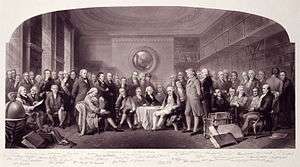
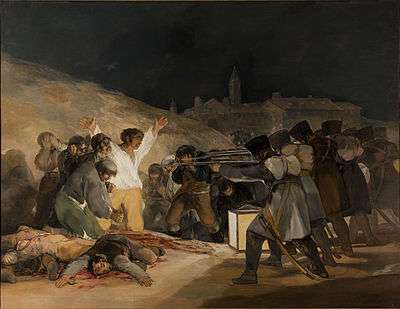
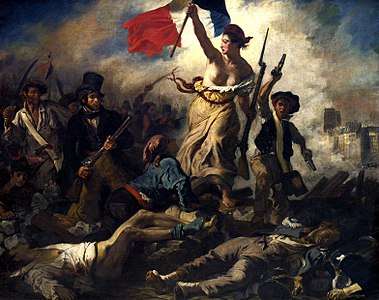

.jpg)
